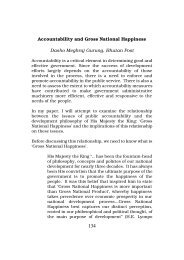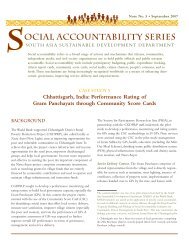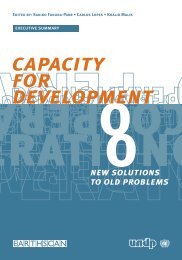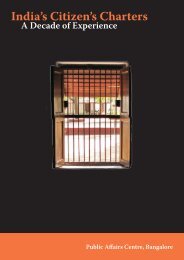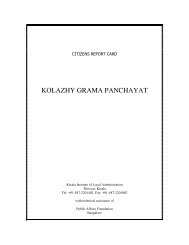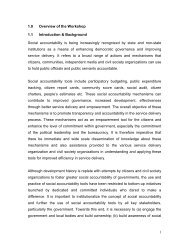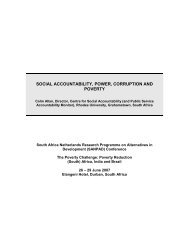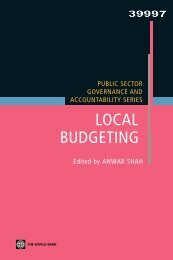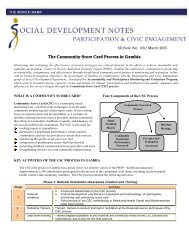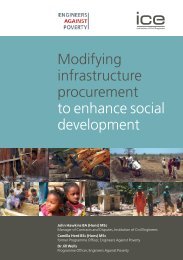Handbook on Citizen Engagement: Beyond Consultation - SASANet
Handbook on Citizen Engagement: Beyond Consultation - SASANet
Handbook on Citizen Engagement: Beyond Consultation - SASANet
- No tags were found...
Create successful ePaper yourself
Turn your PDF publications into a flip-book with our unique Google optimized e-Paper software.
Chapter IV. Instituti<strong>on</strong>alizing <strong>Citizen</strong> <strong>Engagement</strong>In Canada, and around the world, very few governments, departments or large organizati<strong>on</strong>shave instituti<strong>on</strong>alized citizen engagement. Most citizen engagement initiatives flow from a desireto attain specific policy goals and are limited in time and scope. This chapter briefly discussesthe need for and the benefits of instituti<strong>on</strong>alizing citizen engagement.Instituti<strong>on</strong>alizing citizen engagement has both structural and cultural comp<strong>on</strong>ents. First, itrequires that citizen engagement becomes a regular, to-be-expected comp<strong>on</strong>ent of the policydevelopment processes. Sec<strong>on</strong>d, and equally important, the public and policy makers, both ofwhom are currently somewhat skeptical about citizen engagement, need to be c<strong>on</strong>vinced thatcitizen engagement processes and their results are of value and are a legitimate part of policydevelopment and democracy. 11According to Turnbull and Aucoin 12 , there are four criteria necessary for the instituti<strong>on</strong>alizati<strong>on</strong>of public involvement. 131. Public involvement is a core element embedded in the policy process: Rather thanremaining an occasi<strong>on</strong>al project, citizen engagement needs to be incorporated in policydevelopment to the same degree that experts, stakeholders and interest groups are currentlyc<strong>on</strong>sulted. Greater trust can be built in the political process if members of the public do notperceive these efforts to occur <strong>on</strong>ly when it is c<strong>on</strong>venient and instrumental to a largerpolitical agenda.2. Public input is given substantial weight in policy development processes; it cannot be a“token” effort, in percepti<strong>on</strong> or reality: As previously discussed, faith in the currentc<strong>on</strong>sultative process has largely been eroded because citizens feel like their voices are notheard, that their opini<strong>on</strong> has been sought after a decisi<strong>on</strong> has been made or that thec<strong>on</strong>sultati<strong>on</strong> process is in place simply to appease public desire for a say. If <strong>on</strong>e of theoverarching goals of citizen engagement is to renew faith in political process, then it isabsolutely essential that this point be given substantive c<strong>on</strong>siderati<strong>on</strong> throughout the planningand executi<strong>on</strong> stages so as to not repeat past mistakes.3. The commitment to instituti<strong>on</strong>alized public involvement is government-wide as opposedto c<strong>on</strong>centrated in certain departments: Many barriers to widespread adopti<strong>on</strong> of citizenengagement are the result of prevalent false assumpti<strong>on</strong>s that citizens cannot grasp complexscientific and social problems, and that they are unc<strong>on</strong>cerned with matters that do not directlyaffect them. As discussed, there is both a cultural and structural project ahead if citizenengagement is to be implemented across governments.4. The efforts to instituti<strong>on</strong>alize public involvement include the public service andparliament: Both the public service and parliament have different but complementary rolesto play in instituti<strong>on</strong>alizing citizen engagement. MPs could potentially use citizenengagement as a tool to maintain c<strong>on</strong>tact with their c<strong>on</strong>stituents, to better inform them ofemerging policies and to better equip themselves to debate policy issues. Parliamentarycommittees and local c<strong>on</strong>stituency offices could use citizen involvement exercises to enablecitizens not <strong>on</strong>ly to provide input but to dialogue with MPs <strong>on</strong> policy matters.12 CANADIAN POLICY RESEARCH NETWORKS




